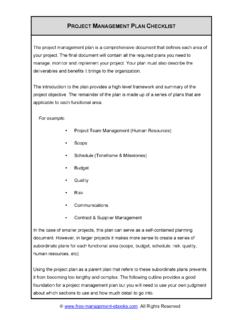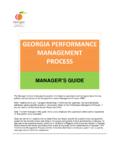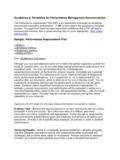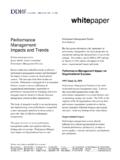Transcription of Performance Management Principles - Free …
1 Team FMEA ppraisal SkillsPerformance Management 978-1-62620-990-9 Copyright Notice 2013. All Rights ReservedISBN 978-1-62620-990-9 The material contained within this electronic publication is protected under International and Federal Copyright Laws and treaties, and as such any unauthorized reprint or use of this material is strictly may not copy, forward, or transfer this publication or any part of it, whether in elec-tronic or printed form, to another person, or or translation of any part of this work without the permission of the copy-right holder is against the downloading and use of this eBook requires, and is an indication of, your complete acceptance of these Terms of Use.
2 You do not have any right to resell or give away part,or the whole, of this 978-1-62620-990-9 1 Performance Management PrinciPleStable of contentsPreface 2 Visit Our Website 3 Introduction 4 Principles of Performance Management 5 Maximize Engagement Using the OSCAR Principles 7 Always be Objective 8 Set SMART Goals 11 Competencies to Match Responsibilities 13 Assess Performance against Role Description 15 Review Based on Contribution to the Organization 16 The Appraisal Process 17 Stages of the Appraisal Process 20 Stage 1 Conduct appraisal meeting 20 Stage 2 Define & agree SMART goals 21 Stage 3 Describe role competencies 22 Stage 4 Person agrees & commits to goals 23 Stage 5 Agree & conduct review sessions 23
3 Stage 6 Gather Performance data 24 Stage 7 Write your Performance summary for person 24 Stage 8 Person comments on your summary 25 Summary 27 Other Free Resources 28 References 29 ISBN 978-1-62620-990-9 2 Performance Management PrinciPleSPrefaceThis eBook will provide you with a firm understanding of the Principles behind perfor-mance Management as well as practical advice for completing each stage of the appraisal will learn how to: Incorporate the four drivers of employee engagement that are needed to support a successful Performance Management system. Use the OSCAR Principles to help you maximize commitment and encourage your team to achieve goals and develop their competencies.
4 Be totally objective and avoid the eight most common causes of bias when mak-ing judgments about individual Performance . Develop a holistic Performance Management that can bring you significant pro-ductivity gains with a modest investment in time. Collect the data you need for productive, stress-free and motivational appraisal meetings. ISBN 978-1-62620-990-9 3 Performance Management PrinciPleSVisit our WebsiteMore free Management eBooks along with a series of essential templates and check-lists for managers are all available to download free of charge to your computer, iPad, or Amazon are adding new titles every month, so don t forget to check our website regularly for the latest ISBN 978-1-62620-990-9 4 Performance Management PrinciPleSintroductionOne of the most important aspects of Management is that of monitoring and improving Performance .
5 Many managers never receive any formal training in this critical area and are left to interpret things on their own or base their behavior on what their own annual appraisals have shown them. Even if your organization provides a manual describing the appraisal process it is unlikely to explain fundamental Principles behind Performance Management . This often leaves managers feeling they have little support and guidance in this crucial area. The Performance Management set of eBooks is designed to provide you with a firm un-derstanding of the Principles behind Performance Management as well as provide practi-cal advice for each stage of the of Performance Managementform basis of the Appraisal CycleYou then need to adapt these Performance Management Principles to suit the culture of your organization and its own appraisal process.
6 This cyclical appraisal process is usually conducted on an annual basis and is a vital as-pect of managing your organization s overall Performance . Your responsibility as a man-ager is to ensure that the annual appraisals you conduct are effective and have a positive impact on your team s Performance . Key POINTS 4 Many managers never receive any formal training in the appraisal process. 4An understanding of the Principles behind Performance Management can help to make up for this lack of formal 978-1-62620-990-9 5 Performance Management PrinciPleSPrinciples of Performance Management A well-designed and effective appraisal process has two important functions.
7 Firstly, it forms a clear basis for the ongoing relationship between a team member and their man-ager. Secondly, it creates an effective Performance Management system that clarifies the relationship between the individual and the organization. Functions of Performance Management1. Create ongoing relationship between individual & manager2. Clarifi es the relationship between an individual and the organizationThis second function is frequently neglected or poorly defined even though it is equally important. By clearly showing a team member how their role contributes to the success of the department, division, and therefore the organization as a whole increases the de-gree to which that individual will engage with the goals of the organization.
8 This level of engagement is something that changes over time depending on how well the day-to-day activities of the department are progressing and the degree of empathy there is between the personalities of the employee and the manager. Understanding how your own personality and role as a manager can influence the Performance of others is vital to your success in getting the best Performance from those who report to correlation between high levels of Performance and employee engagement was the subject of the MacLeod Report, which was commissioned by the UK government in 2009. This report, by David MacLeod and Nita Clarke, took an in-depth look at employee en-gagement and its potential Performance benefits for both organizations and employees.
9 ISBN 978-1-62620-990-9 6 Performance Management PrinciPleSlead to better performanceHigh levels of employee engagementMacLeod Report FoundThe MacLeod Report pointed to a number of studies that demonstrate that high levels of engagement lead to better financial Performance in the private sector and better out-comes in the public sector. The report identified the four main drivers of employee engagement as: 1. Leadership that ensures a strong, transparent, and explicit organizational culture that gives employees a line of sight between their job and the vision and aims of the Engaging managers who offer clarity, show appreciation of employees effort and contribution, treat their people as individuals, and ensure that work is organized efficiently and effectively so that employees feel they are valued, and equipped and supported to do their job.
10 3. Employees feeling they are able to voice their ideas and be listened to, both about how they do their job and in decision making in their own department, with shar-ing of problems and challenges and a commitment to arrive at joint Employees believing that the organization is fully committed to the values that it promotes, and that behavior throughout the organization is consistent with these stated values. This leads to trust and integrity, whereas any gap between these creates distrust and can activate each of these drivers through the appraisal process by making sure that your own behavior supports them wherever possible. Key POINTS 4An effective Performance Management system strives to increase the level of engagement between the individual and the organization.


















